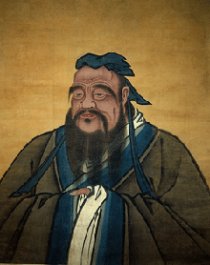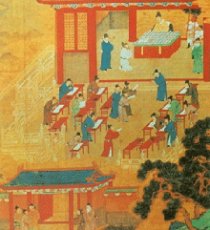 Confucianism
Confucianism
Many Chinese scholars believe the history of education in China can be traced back at as far as the 16th century B.C. during the late "Xia Dynasty" (1523-1027 B.C.). Throughout this period of time, education was the privilege of the elites. The teachings of Confucianism during the Spring and Autumn and Warring States periods (770-221 B.C.), the curriculum were mainly based on The Four Books and The Five Classics. The Four Books and The Five Classics were the acknowledged subjects of the Confucian culture in the feudal society in ancient China. The Four Books refers to The Great Learning, The Doctrine of the Mean, Confucian Analects and The Works of Mencius. And The Five Classics includes The Book of Poetry (also known as The Book of Songs, The Book of Odes), The Book of History, The Book of Rites, The Book of Changes, and The Spring and Autumn Annals.
Confucianism probably is the biggest influence in education of China throughout the entire Chinese history. Later in Han Dynasty, a form of public education system was established. Not only elites from upper class families can study in school, common man can also use education as a path to become a better man, known as gentleman.
 In Confucianism, a gentleman (Chun Tzu) considers what is right, when the peasant considers what will pay. A gentleman trusts in justice and the peasant trusts in favor. A gentleman is generous and fair, when the peasant is biased and petty. A gentleman looks within for guidance and the peasant looks unto others. A gentleman is easy to serve, and hard to please. The peasant is hard to serve, and easy to please. A gentleman is to know what we know, and know what we do not know.
In Confucianism, a gentleman (Chun Tzu) considers what is right, when the peasant considers what will pay. A gentleman trusts in justice and the peasant trusts in favor. A gentleman is generous and fair, when the peasant is biased and petty. A gentleman looks within for guidance and the peasant looks unto others. A gentleman is easy to serve, and hard to please. The peasant is hard to serve, and easy to please. A gentleman is to know what we know, and know what we do not know.
Civil Exam
On the other hand, the common people should follow the traditions and rules. In ancient Chinese culture, there was no need for the common people to know why. For common people, studying Confucianism and be a gentleman had been the most efficient way for them advancing into upper class. During Han dynasty, the first civil service exam was set up. Confucianism, with no surprise, was one of the key subjects to study for the civil service exam. Provincial schools were established countrywide and the Confucianism tradition of education was spread all over China. "To enrich your family, there is no need to buy good land: Books hold a thousand measures of grain.
For an easy life, there is no need to build mansion: In books are found houses of gold. When you go out, do not be upset if no one follows you: In books there will be a crowd of horses and carriages. If you wish to marry, don’t be upset if you don't have a go-between: In books there are girls with faces like jade. A young man who wishes to be somebody will devote his time to the Classics. He will face the window and read." There were people who spend their entire lifetime studying on Confucianism in order to get respected, not only for themselves, but also for the pride of their family lines.









 The China Education and Research Network (CERNET; Chinese: 中国教育和科研计算机网; pinyin: Zhōngguó jiàoyù hé kēyán jìsuànjī wǎng) is the first nationwide education and research computer network in China. The CERNET project is funded by the Chinese government and...
The China Education and Research Network (CERNET; Chinese: 中国教育和科研计算机网; pinyin: Zhōngguó jiàoyù hé kēyán jìsuànjī wǎng) is the first nationwide education and research computer network in China. The CERNET project is funded by the Chinese government and...